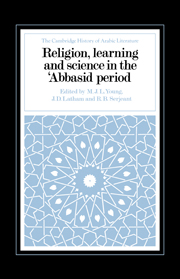Book contents
- Frontmatter
- Epigraph
- Contents
- List of plates
- Editorial preface
- List of abbreviations
- Map Literary, political and religious centres in the ʿAbbasid period
- 1 Sunnī theology
- 2 Shīʿī theological literature
- 3 Ibāḍī theological literature
- 4 Quranic exegesis
- 5 The prose literature of Ṣufism
- 6 Philosophical literature
- 7 Arabic lexicography
- 8 Arabic grammar
- 9 Islamic legal literature
- 10 Administrative literature
- 11 Arabic biographical writing
- 12 History and historians
- 13 Faṭimid history and historians
- 14 Mathematics and applied science
- 15 Astronomy
- 16 Astrology
- 17 Geographical and navigational literature
- 18 The literature of Arabic alchemy
- 19 Arabic medical literature
- 20 Al-Kindī
- 21 Al-Rāzī
- 22 Al-Fārābī
- 23 Ibn Sīnā
- 24 Al-Bīrūnī and the sciences of his time
- 25 Al-Ghazālī
- 26 Christian Arabic literature in the ʿAbbasid period
- 27 Judaeo-Arabic literature
- 28 The translation of Greek materials into Arabic
- 29 Didactic verse
- Glossary
- Bibliography
- Index
15 - Astronomy
Published online by Cambridge University Press: 05 July 2014
- Frontmatter
- Epigraph
- Contents
- List of plates
- Editorial preface
- List of abbreviations
- Map Literary, political and religious centres in the ʿAbbasid period
- 1 Sunnī theology
- 2 Shīʿī theological literature
- 3 Ibāḍī theological literature
- 4 Quranic exegesis
- 5 The prose literature of Ṣufism
- 6 Philosophical literature
- 7 Arabic lexicography
- 8 Arabic grammar
- 9 Islamic legal literature
- 10 Administrative literature
- 11 Arabic biographical writing
- 12 History and historians
- 13 Faṭimid history and historians
- 14 Mathematics and applied science
- 15 Astronomy
- 16 Astrology
- 17 Geographical and navigational literature
- 18 The literature of Arabic alchemy
- 19 Arabic medical literature
- 20 Al-Kindī
- 21 Al-Rāzī
- 22 Al-Fārābī
- 23 Ibn Sīnā
- 24 Al-Bīrūnī and the sciences of his time
- 25 Al-Ghazālī
- 26 Christian Arabic literature in the ʿAbbasid period
- 27 Judaeo-Arabic literature
- 28 The translation of Greek materials into Arabic
- 29 Didactic verse
- Glossary
- Bibliography
- Index
Summary
During the millennium which followed the introduction of mathematical astronomy from Indian, Sasanid and Hellenistic sources to the vigorous cultural scene of ʿAbbasid Iraq in the second/eighth and third/ninth centuries, Muslim astronomers compiled a remarkably rich and varied corpus of literature relating to their subject. Some of this literature survives in about 10,000 manuscript volumes preserved in the libraries of southwestern Asia, north Africa, Europe and the United States, and during the past 200 years a very small number of scholars has turned its attention to a fraction of this surviving material. Catalogues of varying quality exist for some library collections, but there are many important collections of scientific manuscripts which are not yet catalogued at all. Lists of medieval authors, titles of their works and available manuscripts thereof, have been prepared from these catalogues by H. Suter, C. Brockelmann, C. A. Storey and F. Sezgin.
No classification of the Islamic astronomical literature exists in the modern literature, and besides, the scope of this literature has only become known during the past few decades. The present chapter represents an attempt to fill this gap, and to discuss the different categories of Islamic astronomical literature, the variety of which reflects the keen interest of Muslim scholars in astronomy for over a millennium. Very little of the Islamic material was transmitted to Europe in the medieval period, and that which was transmitted was hardly representative of the whole.
- Type
- Chapter
- Information
- Religion, Learning and Science in the 'Abbasid Period , pp. 274 - 289Publisher: Cambridge University PressPrint publication year: 1990
- 1
- Cited by



